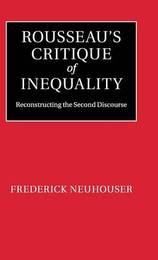
|
Rousseau's Critique of Inequality: Reconstructing the Second Discourse
Hardback
Main Details
| Title |
Rousseau's Critique of Inequality: Reconstructing the Second Discourse
|
| Authors and Contributors |
By (author) Frederick Neuhouser
|
| Physical Properties |
| Format:Hardback | | Pages:250 | | Dimensions(mm): Height 216,Width 140 |
|
| Category/Genre | Western philosophy - c 1600 to c 1900
Social and political philosophy |
|---|
| ISBN/Barcode |
9781107064744
|
| Classifications | Dewey:194 |
|---|
| Audience | | Professional & Vocational | |
|---|
|
Publishing Details |
| Publisher |
Cambridge University Press
|
| Imprint |
Cambridge University Press
|
| Publication Date |
19 June 2014 |
| Publication Country |
United Kingdom
|
Description
Rousseau's Discourse on the Origin of Inequality among Mankind, published in 1755, is a vastly influential study of the foundations of human society, including the economic inequalities it tends to create. To date, however, there has been little philosophical analysis of the Discourse in the literature. In this book, Frederick Neuhouser offers a rich and incisive philosophical examination of the work. He clarifies Rousseau's arguments as to why social inequalities are so prevalent in human society and why they pose fundamental dangers to human well-being, including unhappiness, loss of freedom, immorality, conflict, and alienation. He also reconstructs Rousseau's four criteria for assessing when inequalities are or are not legitimate, and why. His reconstruction and evaluation of Rousseau's arguments are accessible to both scholars and students, and will be of interest to a broad range of readers including philosophers, political theorists, cultural historians, sociologists, and economists.
Author Biography
Frederick Neuhouser is Professor of Philosophy at Barnard College, Columbia University. He is the author of Rousseau's Theodicy of Self-Love: Evil, Rationality, and the Drive for Recognition (2008), Actualizing Freedom: The Foundations of Hegel's Social Theory (2000), and Fichte's Theory of Subjectivity (Cambridge, 1990).
Reviews'For two decades now Frederick Neuhouser has been one of the most brilliant philosophical readers of Rousseau that we have, and his new book offers a masterly reconstruction of the central argument of the Second Discourse. Solid in exposition, tightly argued throughout, and compelling in the details, Neuhouser shows clearly - as so much of the scholarship does not - just what Rousseau's answers in fact were to the two questions he set himself to answer: what is the origin of human inequality, and does it have its foundations in the natural law?' Christopher Brooke, University of Bristol 'Neuhouser's penetrating study of Rousseau's Discourse is doubly welcome. First, it serves as a useful reconstruction of the central argument of the Discourse concerning the sources of inequality and its pervasiveness in modern society. Second, his study goes beyond a commentary by actively engaging Rousseau's own critical examination of inequality and showing its relevance for thinking about the economic, social, and political inequalities we continue to face today.' John Scott, University of California
|